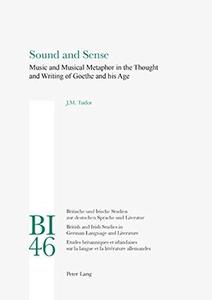
Sound and Sense: Music and Musical Metaphor in the Thought and Writing of Goethe and his Age By J.M. Tudor
2011 | 515 Pages | ISBN: 3034302371 | PDF | 4 MB
This study focuses on beliefs about music current in eighteenth-century Germany. Of particular interest are the conceptual metaphors through which major writers (Goethe, Schiller, Herder and Klopstock) used music as analogy and medium for perceptions of the world in their writing. The book surveys traditional metaphors (music as harmony/disharmony, music as like/unlike language, music as structured by mathematical proportion or by rhythm) inherited from Greek and French thought and looks at ways in which these writers also assimilated and developed contemporary ideas (especially from Leibniz, the French Rationalists, Rameau and Rousseau). German writers of this epoch had a remarkably rich and varied range of ideas of music at their disposal, some of which could also be realised in multi-media genres. With the help of modern theory from several fields, the study aims to show how they deployed these resources in ways both like and unlike the practice of Romantic writers with whom they overlapped at the end of the century.

Soldier: Respect Is Earned by HarperCollins
English | May 4, 2021 | ISBN: 0008418152 | 152 pages | PDF | 1.00 Mb
With four years in the Parachute Regiment, ten years in the SAS and two Everest summits to his name, no one is better equipped than Jay Morton to reveal what it takes to become the best of the best.

Societies from Ancient America: Historical Facts and Discoveries about the Aztec and Inca People by Kelly Mass
English | 2021 | ISBN: N/A | ASIN: B09FZTTW64 | 103 pages | EPUB | 0.17 Mb
This is a 2-book combo. These are the titles:
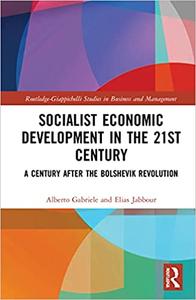
Alberto Gabriele, "Socialist Economic Development in the 21st Century: A Century after the Bolshevik Revolution "
English | ISBN: 1032212209 | 2022 | 374 pages | PDF | 16 MB
Over a hundred years after the first socialist revolution broke the global monopoly of capitalism, a new class of socialist-oriented socioeconomic development is coming to the fore. Capitalism is still dominant worldwide, although its hegemony is no longer undisputed, and humankind is now faced with a key existential challenge. This book proposes an alternative path to overcoming the worldwide crisis of globalized capitalism. It offers a novel, balanced and historically rooted interpretation of the successes and failures of socialist economic construction throughout the last century.
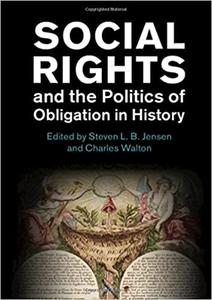
Steven L. B. Jensen, "Social Rights and the Politics of Obligation in History "
English | ISBN: 1316519236 | 2022 | 335 pages | PDF | 5 MB
This pioneering volume explores the long-neglected history of social rights, from the Middle Ages to the present. It debunks the myth that social rights are 'second-generation rights' - rights that appeared after World War II as additions to a rights corpus stretching back to the Enlightenment. Not only do social rights stretch back that far; they arguably pre-date the Enlightenment. In tracing their long history across various global contexts, this volume reveals how debates over social rights have often turned on deeper struggles over social obligation - over determining who owes what to whom, morally and legally. In the modern period, these struggles have been intertwined with questions of freedom, democracy, equality and dignity. Many factors have shaped the history of social rights, from class, gender and race to religion, empire and capitalism. With incomparable chronological depth, geographical breadth and conceptual nuance, Social Rights and the Politics of Obligation in History sets an agenda for future histories of human rights.
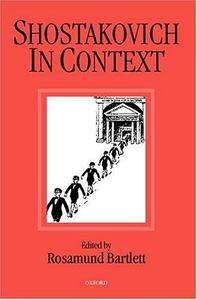
Shostakovich in Context By Rosamund Bartlett
2000 | 248 Pages | ISBN: 0198166664 | PDF | 6 MB
This volume presents recent research into Dmitri Shostakovich's life (1906-1975) and work by leading British, American, Russian, and Israeli scholars. It is occasioned by the ever-growing interest in a composer whose significance in and for the history of twentieth-century music is, as Richard Taruskin has commented, immense, possibly unparalleled and above all, continuing. The authors of the thirteen articles are musicologists, Russian literature specialists, biographers, and cultural historians, whose diverse fields of expertise are reflected in the interdisciplinary nature of the materials collected here. The collection presents Shostakovich and his legacy in a variety of different contexts and its interdisciplinary nature will also serve to open up discussion. In this way, it breaks from previous tendencies to focus on the purely extrinsic qualities of the composers musical oeuvre, which has so often been interpreted in terms of autobiography. The chapters span the composers entire career and contain substantial amounts of new information about Shostakovich and his musical legacy.
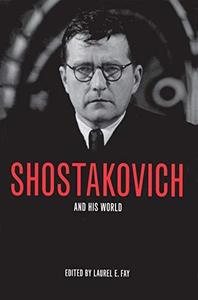
Shostakovich and His World By Laurel E. Fay
2004 | 429 Pages | ISBN: 0691120692 | PDF | 8 MB
Dmitri Shostakovich (1906-1975) has a reputation as one of the leading composers of the twentieth century. But the story of his controversial role in history is still being told, and his full measure as a musician still being taken. This collection of essays goes far in expanding the traditional purview of Shostakovich's world, exploring the composer's creativity and art in terms of the expectations--historical, cultural, and political--that forged them. The collection contains documents that appear for the first time in English. Letters that young "Miti" wrote to his mother offer a glimpse into his dreams and ambitions at the outset of his career. Shostakovich's answers to a 1927 questionnaire reveal much about his formative tastes in the arts and the way he experienced the creative process. His previously unknown letters to Stalin shed new light on Shostakovich's position within the Soviet artistic elite. The essays delve into neglected aspects of Shostakovich's formidable legacy. Simon Morrison provides an in-depth examination of the choreography, costumes, décor, and music of his ballet The Bolt and Gerard McBurney of the musical references, parodies, and quotations in his operetta Moscow, Cheryomushki. David Fanning looks at Shostakovich's activities as a pedagogue and the mark they left on his students' and his own music. Peter J. Schmelz explores the composer's late-period adoption of twelve-tone writing in the context of the distinctively "Soviet" practice of serialism. Other contributors include Caryl Emerson, Christopher H. Gibbs, Levon Hakobian, Leonid Maximenkov, and Rosa Sadykhova. In a provocative concluding essay, Leon Botstein reflects on the different ways listeners approach the music of Shostakovich.
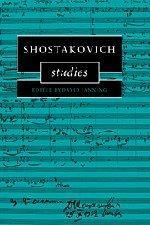
Shostakovich Studies By David Fanning
1995 | 292 Pages | ISBN: 0521452392 | PDF | 6 MB
Few composers' posthumous reputations have grown as steadily as Shostakovich's. Yet outside the concert hall the focus of attention seems to have been on the extraordinary circumstances of his life rather than on the music itself. This book seeks to show that the power of his work stems as much from its craftsmanship as from its political and personal context. The eleven essays lay a foundation for a proper understanding of Shostakovich's musical language as well as providing new insights into the issues surrounding his composition.
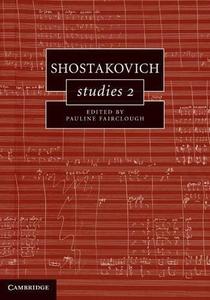
Shostakovich Studies 2 By Pauline Fairclough
2010 | 339 Pages | ISBN: 0521111188 | PDF | 11 MB
When Shostakovich Studies was published in 1995, archival research in the ex-Soviet Union was only just beginning. Since that time, research carried out in the Shostakovich Family Archive, founded by the composer's widow Irina Antonovna Shostakovich in 1975, and the Glinka Museum of Musical Culture has significantly raised the level of international Shostakovich studies. At the same time, scholarly understanding of Soviet society and culture has developed significantly since 1991, and this has also led to a more nuanced appreciation of Shostakovich's public and professional identity. Shostakovich Studies 2 reflects these changes, focusing on documentary research, manuscript sources, film studies and musical analysis informed by literary criticism and performance. Contributions in this volume include chapters on Orango, Shostakovich's diary, behind-the-scenes events following Pravda's criticisms of Shostakovich in 1936 and a new memoir of Shostakovich by the Soviet poet Evgeniy Dolmatovsky, as well as analytical studies from a range of perspectives.
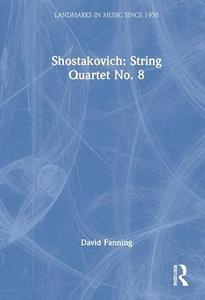
Shostakovich: String Quartet No. 8 By David Fanning
2004 | 204 Pages | ISBN: 0754606996 | PDF | 5 MB
When it was first performed in October 1960, Shostakovich's Eighth String Quartet was greeted with a standing ovation and was given a full encore. Its popularity has continued to the present day with over 100 commercial recordings appearing over the last 40 years. The appeal of the work is not hard to identify. Immediately communicative, the quartet also contains rich seams of deeper meaning. This book examines its musical design in detail and seeks to overthrow the charges of superficiality that have arisen as a result of the work's popular success. The core of the study is the close analysis of the work, but this is placed in context with a discussion of Shostakovich's reputation and historical position, the circumstances of the quartet's composition and the subsequent controversies that have surrounded it. The work was composed during the so-called "Thaw" years of the Soviet Union, and the cultural and political background of this period is considered, together with Shostakovich's life and work during this time. David Fanning argues that the Eighth String Quartet is a landmark in 20th-century music in its transcendence of the extra-musical meanings that it invokes; that it is "music that liberates itself from the shackles of its contexts."


